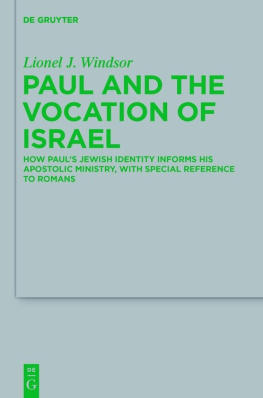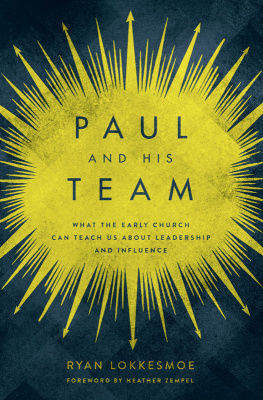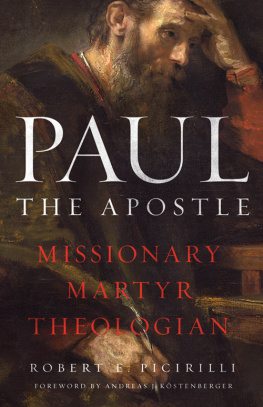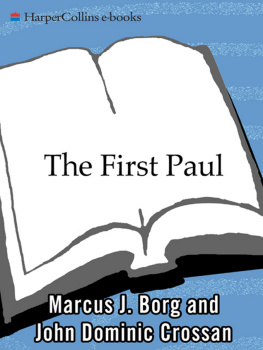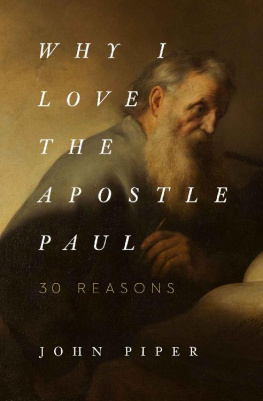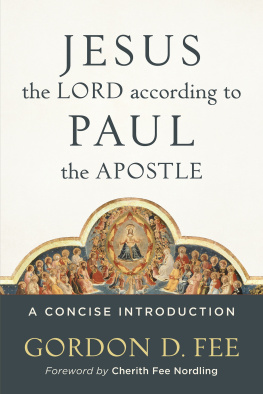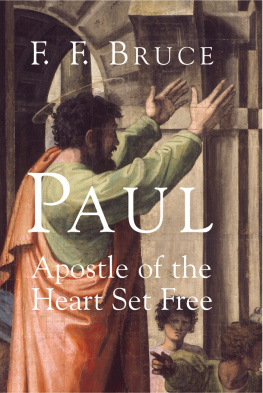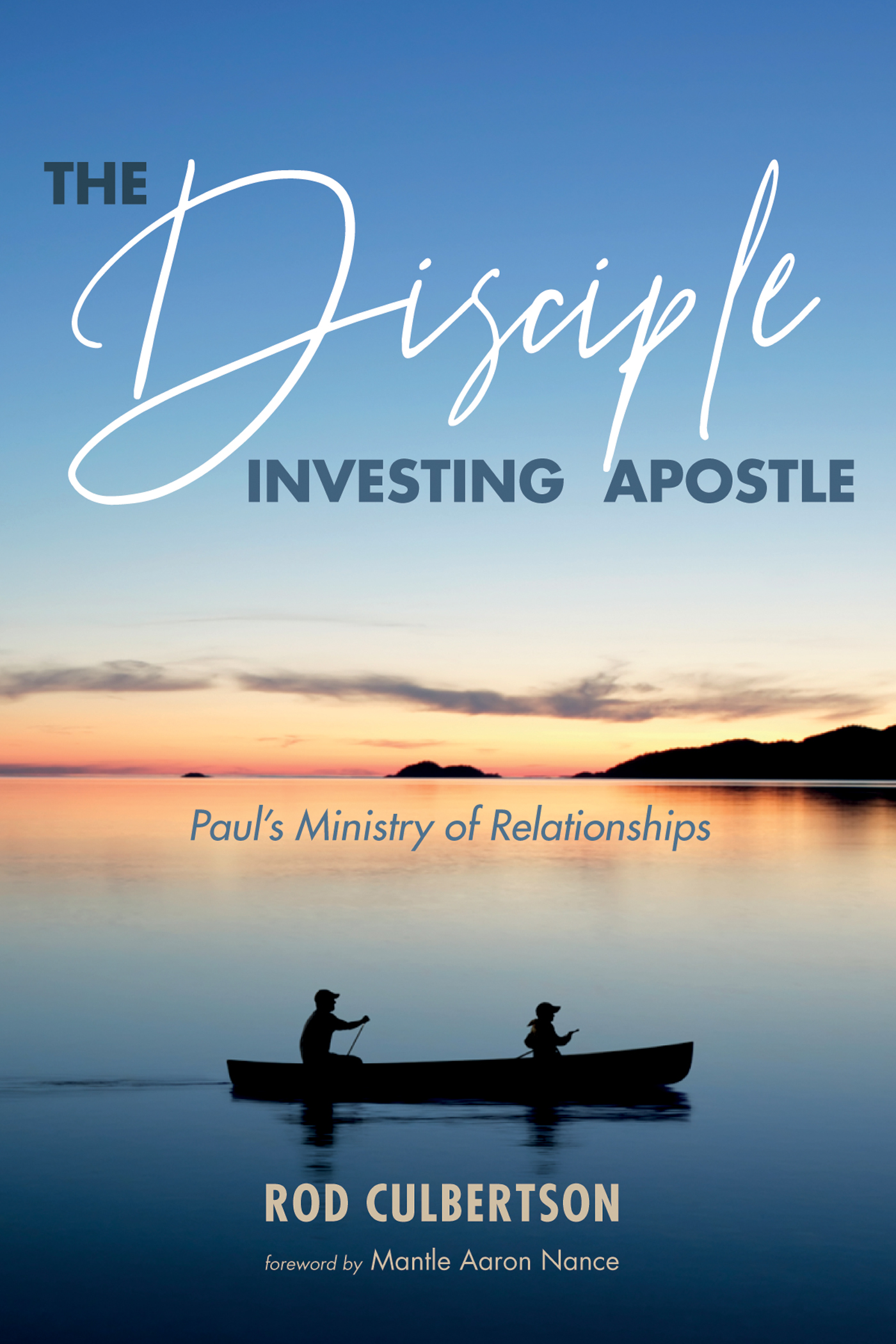With gratitude to a man who invested in me through the multiple avenues of phone conversations, exhaustive teaching and training, personal hospitality, along with constant encouragement and affirmation, I dedicate this book to the Reverend Mr. Mark Lowrey, to whom, humanly speaking, I owe the foundation of my ministry philosophy and means of survival in the service of Christ and his kingdom. The founder of Reformed University Fellowship, Mark, much like the Apostle Paul, was willing to befriend me as an unknown campus minister at the University of Florida, take me under his wings from a distance, come to my aid in times of questioning and need, and to care about my progress and well-being in both ministry life and marriage, as well as in personal growth in Christ-likeness. He has been one of my valued counselors over the years while in the midst of the throes of ministry. I have admittedly taken a circuitous route to seminary teaching, but thanks to Marks interest and investment, I have been prepared to invest in others on the seminary level. Christ is my ultimate discipler, but he has used a multitude of others who were willing to invest in me, a stumbling servant of the Gospel, and Mark is indeed one of those others. Marks willingness to serve me and multiple other campus ministers in the past has not gone unnoticed. With many thanks, I honor him with this book.
Foreword
A ministerial friend and I have sometimes joked that a standard question every aspiring minister should be asked is, Do you loveor at least like people ? While a keen interest in all species (manner) of knowledge, including theology, apologetics, biblical languages, and homiletics, is a wonderful attribute in a minister, surely an interest in and a desire to relate to ones own species should be required!
Rod Culbertson reminds us of this by examining the ministerial life of the erudite, hard charging, task-oriented Apostle Paul, who was, nonetheless, a man who loved people , a man whose compassion for people was a driving force behind all that he did. In Paul we find a man who did not merely have a a mind for theology, or even a vague sort of heart for the lost, but who rolled up his sleeves and evangelized, prayed for, encouraged, honored, discipled, rejoiced with, sorrowed over, and otherwise invested in actual people .
Culbertsons study opens up for us the oft-neglected yet highly impressive network of Pauls disciple-investing relationships. We learn not only from Paul but also from those in whom he invested and those who invested in him. We learn from Barnabas, Timothy, Silas, and Titus; as well as lesser-known disciples such as Tychicus, Trophimus, Erastus, and Aristarchus. We are presented with their relational dynamicstheir complimentary gifts, their shared burdens and successes, their tensions, divisions, and restorations. We are reminded that God chooses to use redeemed sinners and the less-than-perfect relationships between them to build his church.
The discussion questions at the end of each chapter are carefully crafted to facilitate personal reflection and ministerial application. They help make this a profitable resource not only for individuals, but also for small group Bible studies, church staffs, and leadership teams who are looking for a biblical paradigm for investing in the lives of others with the life-transforming truths of Christ.
Ultimately, this study points to the inescapably relational nature of the Christian faith. Our God is the gloriously and eternally relational GodFather, Son, and Holy Spirit. In the gospel he has graciously chosen to restore our relationship with him, which had been lost because of our sin. And now, he has called us, who know the love of the Father, the grace of the Son, and the fellowship of the Holy Spirit, to build relationships with others that they might enter into and grow in a relationship with the God whom they were made to know. To that end, the pages that follow will challenge and equip you to follow in the footsteps of Paul and be a disciple-investor for the growth of the kingdom and the glory of our relational God.
Acknowledgements
I wish to acknowledge the late Rev. Dr. William Larkin, Presbyterian minister and long-time New Testament professor at Columbia International University, who fostered in me a greater love for both Greek and the study of the New Testament books. His ministry in my life should not go unacknowledged. I am grateful for his patient instruction and pastoral care in my life, both while in seminary, and beyond, including my labors in pastoral ministry.
A special word of thanks must also be given to my RTS Charlotte teaching assistant, Ms. Anna Unkefer, who spent countless hours editing this work and refining it for publication. She is an invaluable asset in my efforts toward publishing my books. I often wonder, Where would I be without Anna? Floundering, Im sure!
Introduction
W hat if, seemingly everywhere you turned or every time you met someone, all you could talk about was Christ and what he has done for you? Such a scenario seems difficult to imagine. Some people, if not most, would probably think that you are either overly zealous, a religious fanatic, or just plain crazy. Accordingly, though we dont know what the Apostle Paul was doing every moment he was awake, we do find an overriding passion for the things of Christ as his constant, driving force. And his focus is not narrowfrom his writings, we see that his vision is cast upon telling the entire world about Christ. He believes in Christs Great Commission to go and make disciples of the nations (Matt :) and for Paul it appears that the call to disciple making impacts his every decision, as well as his every relationship. In both Pauls letters, and in Lukes account of Pauls conversion and journeys, we observe a man who is so overcome by Christ that everyone he meets must know about God and his special Redeemer-Son, the Lord Jesus. Even while under house arrest in Philippi, we see Paul rejoicing over the chains that cause others to mock himwhile they simultaneously proclaim Christknowing and being reassured that the gospel is being heard by citizens of Philippi (Phil :). I might contend that the Apostle Paul is one of the most singularly focused individuals the world has ever known and, humanly speaking, his exuding enthusiasm and commitment is powerfully used to not only change his world but to change future world history. Pauls ministry was one of seemingly constant proclamation and teaching. Yet, the aspect of his efforts that often goes unnoticed is that his was a ministry of relationships. Paul developed numerous relationships with the people he met, taught, and served. Paul is one of the most resourceful, energetic, motivated, type A, performance driven, strong, active, and task oriented individuals possible, but these constant energies are centered around one thing: taking the gospel to the people who need it. Relationships are an obvious theme in the life and ministry of the Apostle Paul. And these relationships were wide, diverse, and varied.
It is often implied, if not asserted, that the Apostle Paul specialized in individual discipleship and therefore set forward a model to be followed by any serious disciple maker. I do not agree with that assumption and hope to demonstrate my premise that Pauls ministry was geared toward all manner of individuals and based upon numerous methods, with relationship building being his avenue for gospel proclamation. In the realm of his relationships, I am not convinced that an intense, focused ministry to one other individual was the primary method of the Apostle. I do believe he gave Timothy extra attention and was particularly close to him as a mentor, as well as a spiritual father. However, the Apostle Paul appears to have invested himself in innumerable disciples of Jesus. In order to better understand the Apostle Pauls ministry of disciple investing, we must observe the multiple relationships he had with various individuals. He touched numerous people with his life and influence. With all due respect to the concept of individual discipleship, and hoping not to demean this vital approach to present day ministry, I believe we will observe that Paul never made his primary focus of ministry to be selective, personal, or individual time and attention with another. He certainly touches and impacts others in powerful, individual manners, but he also ministers in large groups, small group clusters, companionship settings, temporary outreach opportunities (evangelistic preaching), and individual miraculous healing situations.


